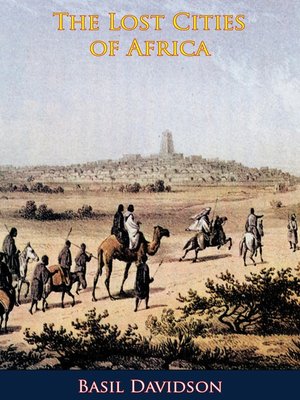
Sign up to save your library
With an OverDrive account, you can save your favorite libraries for at-a-glance information about availability. Find out more about OverDrive accounts.
Find this title in Libby, the library reading app by OverDrive.



Search for a digital library with this title
Title found at these libraries:
| Library Name | Distance |
|---|---|
| Loading... |
Sheba and Ophir, King Solomon's mines, Timbuktu—for centuries the "Dark Continent" of Africa was a land of fabulous, golden legend. The European imagination invested it with great kingdoms and great wealth—a land ruled by a mysterious Christian king, Prester John.
In the past two hundred years, however, these glittering legends have been replaced by a far different belief—that Africa is a land without a past, without history; that its peoples have always lived in savagery, in what has been described as "centuries-long stagnation." The numerous and impressive archeological traces of earlier African civilizations have been ignored or attributed to a lost people. However, the truth is being found in the archeological record. There was a civilization, both highly developed and of purely African origin and character.
In reality the great, unknown kingdoms of Punt, and later Kush with its splendid capitol city of Meroë, were advanced African cultures of the upper Nile more than one thousand years before Christ. But the great flowering of African civilization south of the Sahara was medieval: the great kingdoms of Ghana, Mali, and Songhay; the merchant cities of the East African coast, with a thriving Africa-India trade; and the mysterious city-states of the interior, like Zimbabwe and Mapungubwe.
THE LOST CITIES OF AFRICA, by Basil Davidson, is a much-needed survey of what is presently known of the African past. It won the 1960 Anisfield-Wolf Award for best book, exposing the ills of racism in creative literature.
"This is the first book in any language to provide a survey of Africa in the light of recent archeological discoveries. It is admirably constructed, vivid and compelling."—Dr. Gervase Mathew
In the past two hundred years, however, these glittering legends have been replaced by a far different belief—that Africa is a land without a past, without history; that its peoples have always lived in savagery, in what has been described as "centuries-long stagnation." The numerous and impressive archeological traces of earlier African civilizations have been ignored or attributed to a lost people. However, the truth is being found in the archeological record. There was a civilization, both highly developed and of purely African origin and character.
In reality the great, unknown kingdoms of Punt, and later Kush with its splendid capitol city of Meroë, were advanced African cultures of the upper Nile more than one thousand years before Christ. But the great flowering of African civilization south of the Sahara was medieval: the great kingdoms of Ghana, Mali, and Songhay; the merchant cities of the East African coast, with a thriving Africa-India trade; and the mysterious city-states of the interior, like Zimbabwe and Mapungubwe.
THE LOST CITIES OF AFRICA, by Basil Davidson, is a much-needed survey of what is presently known of the African past. It won the 1960 Anisfield-Wolf Award for best book, exposing the ills of racism in creative literature.
"This is the first book in any language to provide a survey of Africa in the light of recent archeological discoveries. It is admirably constructed, vivid and compelling."—Dr. Gervase Mathew







